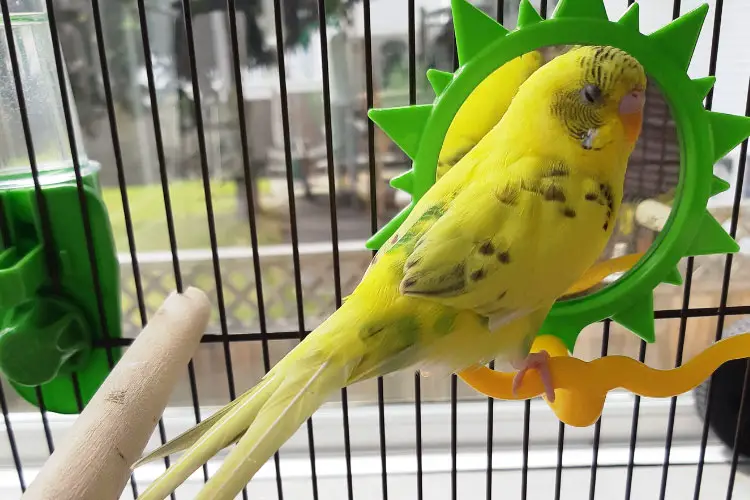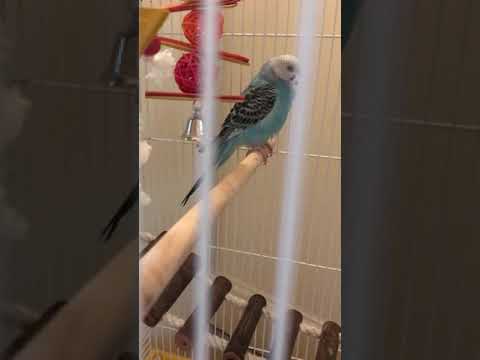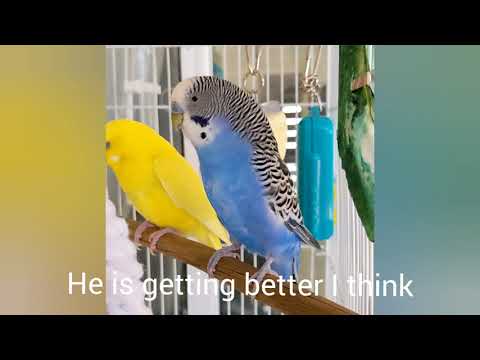Budgies often use their tails, heads, and feathers to let you know when sick, happy, angry, or excited. So, it is not unusual to see your bird’s tail bobbing. However, you might wonder, is your budgie’s tail bobbing normal, or could something be wrong?
Your budgie tail bobbing is typical in most cases as long as it is not pronounced. This happens when your bird is inhaling and exhaling air. However, if the tail movement is prolonged and severe, it could be because your parakeet is sick and has breathing problems.
But how do you treat your budgie tail bobbing when it is pronounced? Our guide has the answers to all of your questions.
Budgie Tail Bobbing: Is This Normal or Something Is Wrong?
The tail bobbing could be normal or not, depending on how severe it is. You see, a budgie’s tail will shake every time the bird breathes in and out. So then, when is budgie bobbing of the tail usual?
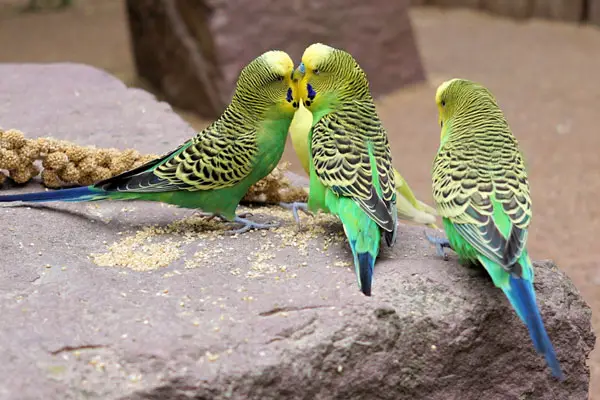
Budgie is afraid
Your budgie will likely breathe faster or harder when it is scared of you or something else. As a result, you may notice its tail slightly moving up and down. This mostly happens when the budgie is still new in your house.
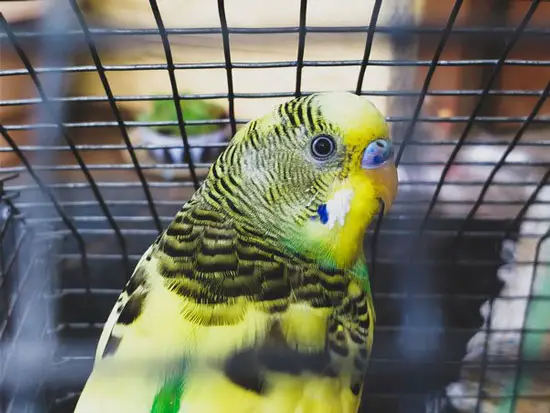
During chirping
Budgies will do a slight tail bob when executing various activities like chirping. This is because while singing, they have to exhale air throughout.
When relaxing or sleeping
While your budgie is sleeping or resting, you may also notice slight tail bobbing. However, this is usually considered a mini version of tail shaking because it is hardly noticeable. The tail movement is a way to help your buddy bird stay in balance.
Tail bobbing during molting
Molting can be extremely taxing and stressful on your budgie’s body. As such, you may notice your bird resting more than usual and bobbing its tail because of distress.
However, sometimes the tail bobbing could be a sign that something is wrong with your budgie. This happens when the tail bob is pronounced, repetitive, or prolonged. In most cases, pronounced tail shake occurs due to respiratory infections. The infections could be on the upper or lower respiratory tract and might be:
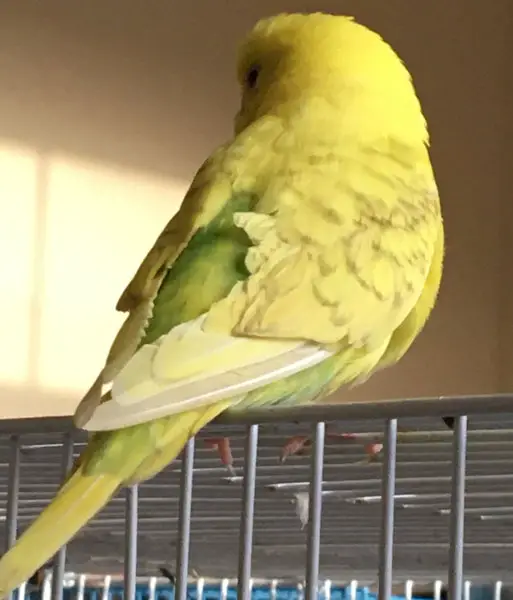
- Viral
- Fungal
- Bacterial
When your budgie bird has respiratory problems, it will experience difficulty breathing. And while trying to put more effort into breathing, you will notice its tail moving up and down. This is because the tail muscles are attached to your bird’s posterior air sacs. But in most cases, if the tail shake is a result of respiratory diseases, your budgie may experience other signs like:
- Coughing and sneezing
- Open-mouth breathing
- Wheezing or gurgling
- Nasal discharge
- Gasping for breath
What Does Budgie Tail Bobbing Mean?
Tail bobbing is when your budgie moves its tail up and down. The budgie’s tail feathers movement can either be quick, short, or sometimes prolonged. This happens because parakeets and other birds don’t have a diaphragm separating their chest cavity from their stomach.
Instead, these pet birds have static lungs and several air sacs throughout their body, allowing them to breathe unidirectionally. As for the abdominal air sacs, they are designed to extend to your bird’s tail. So, you might notice your bird’s tail bobbing whenever air enters and leaves these abdominal sacs.
This type of bird tail movement can either be typical or a sign of illness. Here is a short video of what normal tail bobbing looks like:
Also read: Do Budgies Need to be in Pairs?
Budgie Tail Bobbing But Not Sick?
Your parakeet doesn’t have to be sick to bob its tail feathers up and down. If your budgie does not show any of the following signs, it means the tail bobbing is normal. Therefore, you’ve got nothing to worry about. These signs include:
- Watery eyes and crusts around the nostrils
- Labored breathing
- Prolonged wheezing, sneezing, and coughing
- Regurgitation or vomiting
- Lack of appetite or weight loss
- Sleeping more than normal
- Inability to perch and fluffed posture
Check out this video of a sick budgie bobbing its tail so hard and continuously:
Why Is My Budgie Tail Bobbing and Breathing Through Its Beak?
Sometimes, budgies will often breathe through their beaks when experiencing respiratory distress. Consequently, this also makes them bob their tail feathers repeatedly. In most cases, the tail bobbing and breathing through the beak in your parakeet is caused by:
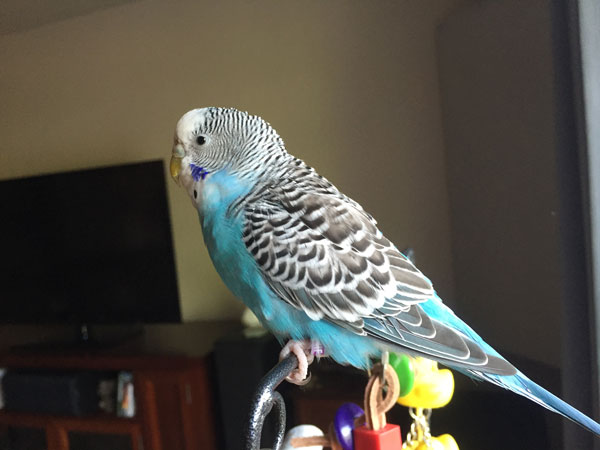
- Infections blocking the nostrils
- Lower respiratory infections affecting the air sacs
- Fungal infections caused by aspergillus
- Protozoa infections
- Partially obstructed air passages by foreign objects
- Poisoning from toxic fumes and gasses
How To Treat Tail Bobbing In Budgies
When your budgie’s tail bobbing seems to be continuous, it means the bird could be sick. Therefore, you must take your parakeet to an avian vet’s clinic for proper diagnosis. This is because the only way to make your budgie stop bobbing its tail is to treat the underlying cause. Bird owners are advised against self-medicating their sick birds.
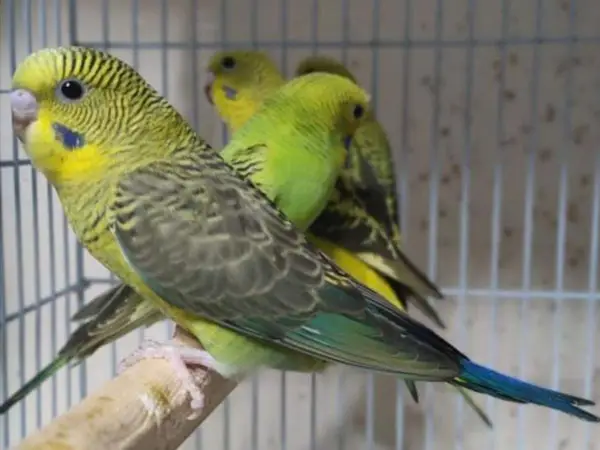
At the vet, you will be given a list of antibiotics if the cause of the bobbing is a respiratory or avian gastric yeast infection. But if it’s not an infection, you could be given a more prolonged treatment plan because not all tail bobbing is due to respiratory issues.
Related: Budgie Temperature Range
FAQs
Have more queries about whether your budgie tail bobbing is normal or not? Check out these commonly asked questions.
Yes. When sleeping, your budgie must also breathe in and out, causing the tail to move slightly up and down. However, if the tail bobbing is more pronounced and prolonged, you should immediately take the bird to an avian veterinarian.
Not really. Parakeets usually bob their heads to seek out attention during the mating season. Sometimes, these parrot species can shake their heads when happy, excited, or to warn other birds not to go near their territory.
Outro
Budgies will often bob their tails slightly while breathing, which is normal. But when the tail bobbing is severe and more noticeable, it is usually a sign of sickness. The good news? You can treat tail bobbing with antibiotics prescribed to your parakeet by a professional avian vet.
